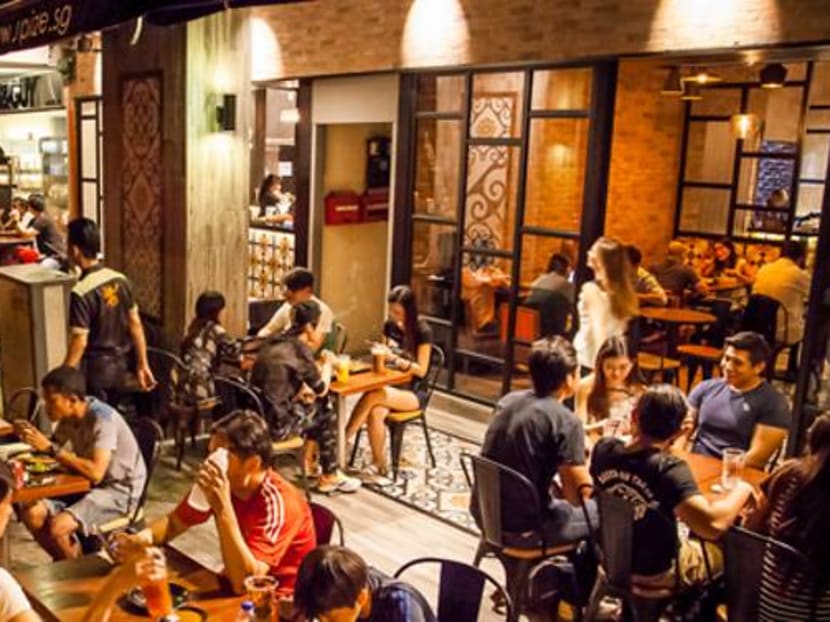No 'definitive link' among three recent cases of food poisoning: MOH
SINGAPORE — Preliminary investigations by the Ministry of Health (MOH) have not established a "definitive link" among the three recent cases of food poisoning, the authorities said on Friday (Nov 30).
SINGAPORE — Preliminary investigations by the Ministry of Health (MOH) have not established a "definitive link" among the three recent cases of food poisoning, the authorities said on Friday (Nov 30).
What they have noticed is that the number of food poisoning cases in Singapore has jumped by 40 per cent on a year-on-year basis from January to October this year, compared to the corresponding period last year.
In the first 10 months of this year, MOH received 271 notifications of food poisoning incidents, involving a total of 1,768 people. In the same period last year, MOH got 272 notifications of food poisoning incidents involving 1,265 people.
The number of food poisoning incidents reported to the authorities fluctuates throughout the year and from year to year, MOH added.
More than 400 people have fallen ill in November alone in three food poisoning cases, with one fatality.
Dr Chia Shi-Lu, chairman of the Government Parliamentary Committee for Health, emphasised that the authorities need to pinpoint the cause of the recent spate of such cases, before any remedial actions can be taken.
"Some of the causes could be due to hygiene lapses, infective agents, or food source contamination," Dr Chia told TODAY.
"They are all different and may need different approaches."
Dr Chia had earlier suggested in an interview with The New Paper that the scale of the incidents and how close they followed one another could mean the cause might well be a bug or a contaminated source.
Associate Professor Hsu Li Yang, an infectious diseases expert from the Saw Swee Hock School of Public Health at the National University of Singapore, said that in some cases, contamination occurs at a source in the food chain, even before reaching food establishments.
He cited a recent salmonella outbreak involving raw turkey products in the United States that infected 164 people in 35 American states as an example. In such cases, food poisoning will be widespread, affecting not just caterers, but households that bought the contaminated food product.
Ms Manzhi Zheng, senior underwriter at insurer Swiss Re Corporate Solutions, explained that the food industry is especially prone to cross-contamination as supply chains become longer and more complex.
“Additionally, many manufacturers are sourcing their components, ingredients or raw materials from fewer suppliers with global supply chains, which increases the risk of a 'ripple effect',” said Ms Zheng, who specialises in product liability and recall.
In an April epidemiological news bulletin by MOH investigating a food poisoning incident which affected 86 students and staff member of a boarding school last year, the article said that about 40 to 60 per cent of food poisoning cases could be attributed to poor food-handling practices.
Citing other sources such as the Centre for Food Safety in Hong Kong, the article said that the most common agents for food poisoning are salmonella, shigella, vibrio, campylobacter, norovirus and rotavirus.
The news bulletin noted that some bacteria which cause food poisoning are heat-resistant and are not destroyed by reheating.
There are more than 38,000 food retail establishments in Singapore, and the National Environment Agency (NEA) has been conducting unannounced inspections to ensure food hygiene compliance.
As of Friday, more than 80 food retail establishments have been suspended by the NEA this year for accumulating 12 demerit points or more within a 12-month period under its Point Demerit System.
Last year, NEA took 3,100 enforcement actions against food retail establishments and suspended the licences of 135 food retail establishments.
Earlier in the week on Monday, 131 people — including kindergarten students and teachers — were hit by gastroenteritis, making it the third major case of food poisoning in November.
The children and teachers were at a learning camp when they fell ill after consuming food prepared by FoodTalks Caterer and Manufacturer located at Shimei East Kitchen along Bedok North Street 5.
Last Friday, 190 people fell ill after eating food prepared by TungLok Catering for the Singapore Civil Defence Force’s public exhibition at the Singapore Expo.
On Nov 9, the NEA announced that it had suspended the licence of popular eatery Spize at River Valley Road after 81 cases of gastroenteritis were traced to bento-box meals prepared by the restaurant for a Deepavali celebration by security firm Brink’s Singapore.
At least 45 people were hospitalised, and 38-year-old Fadli Salleh, an officer from airport services and food solutions provider Sats, died on Nov 14 at the Sengkang General Hospital.
The cause of Fadli's death is pending as it has been classified as a coroner’s case, the Ministry of Health said.







